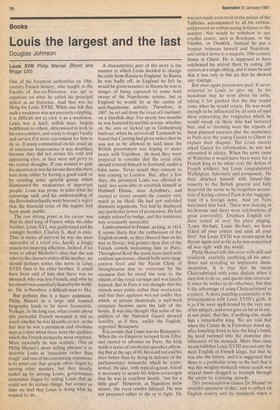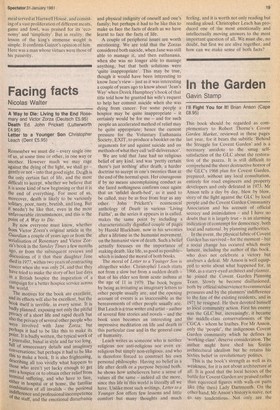Books
Louis the largest and the last
Douglas Johnson
Louis XVIII Philip Mans& (blond and Briggs £20) One of the foremost authorities on 19thcentury French history, who taught in the Faculty of Aix-en-Provence, was apt ' to expatiate on what he called his principal defect as an historian. And that was his liking for Louis XVIII. While one felt that such a weakness was not precisely crippling, it is difficult not to view it as a weakness. Louis was a hard, selfish man, largely. indifferent to others, determined to look to his own comfort, and ready to forget loyalty and service if it were convenient for him to do so. If many commented on his usual air of courteous benevolence it was doubtless because they did not notice his cold and appraising eyes, as they were not privy to his cynical thoughts. If one wanted to gain his attention or win his favour then this were best done either by having a good cook or by retailing some spiteful gossip which illuminated the weaknesses of important people. Louis was prone to echo what his entourage said, and his understanding of the Revolution hardly went beyond a regret that the financial crisis of the regime had been made public.
The one strong point in his career was that he died king of France while his elder brother, Louis XVI, Was guillotined and his younger brother, Charles. X, died in exile. Thus in terms of survival he was the most successful of a royal trio, hardly a kingly reason for inspiring affection. Indeed, if we were to adopt Michelet's idea that the son inherits the characteristics of his mother, we should perhaps notice this more in Louis XVIII than in his elder brother. It could have been said of him that there was no monarch who was less French, and who by his obesity was essentiallySaxonby his mother. He is therefore a difficult man to like.
But perhaps this is a hasty judgment. Philip Mansel in a large and learned biography tends to be more favourable. Perhaps, in the long run, what counts about this particular French monarch is not so Much whether he was likeable or not, as the fact that he was a persistent and obstinate man at a time when these were,the qualities which the French monarchy most required. More especially he was realistic. One of Philip Mansel's more telling phrasesis to describe Louis as 'tenacious rather than tough' and one of his convincing arguments is to point out that people often began by serving other masters, but they usually ended up by serving Louis; governments sometimes began by telling Louis that he could not do certain things, but sooner or later we find that Louis is doing what he wanted to do. A characteristic part of the story is the manner in which Louis decided to change his exile from Russia to England. In Russia he was badly off, in England he felt he would be given luxuries; in Russia he was in danger of being captured by some bold sweep of the Napoleonic armies, but in England he would be at the centre of anti-Napoleonic activity. Therefore, in 1807, he set sail from the coast of Courland, on a Swedish ship. For nearly two months he was battered by terrible storms, whether on the seas or locked up in Gothenburg harbour; when he arrived off Yarmouth he found that Canning had given orders that he was not to be allowed to land since the British government was hopingto make peace with Napoleon. At most they were prepared to consider that the royal exile should conceal himself in Scotland, under a false name. Never would they consent to him coining to London. But, after a few days, the persistent Louis was allowed to land, was soon .able to establish himself at Hartwell House, near Aylesbury, and started to travel around the country very much as he liked. He had not unfolded dramatic arguments. Nor had he displayed any particula r _power of persuasion. He had simply refused to budge, and this insistence was eventually successful.
Louis returned to France, as king, in 1814. It seems likely that the enthusiasm of the English crowds. as they cheered him on his way to Dover, was greater than that of the French crowds welcoming him to Paris. Throughout Kent the roads were lined with exultant spectators, church bells were rung, cannon fired and the • Parish Clerk of Sittingbourne was 'so, overcome by the occasion that he stood too near to the wheels of the royal carriage and was fatally injured. But in Paris it was thought that the crowds were polite rather than overjoyed, and that their applause was not unlike that which, at private 'theatricals, a well-bred company bestows upon the lady of the house,. It was also thought that some of the soldiers of the National Guard showed hostility, as if they, unlike the English, regretted Bonaparte.
It is certain that Louis was no Bonaparte. When the ex-Emperor escaped from Elba, and started to advance on Paris, the king made a series of emotional speeches affirming that at the age of 60, he could not end his days better than by dying in defence of the parliamentary monarchy which he represented. He also, with typical egoism, found it necessary to assure his fellow-sovereigns that Ile was in excellent health, 'but for a little gout'. However, as Napoleon drew nearer, the royal resolve faltered. He was not prepared either to die or to fight. He was not ready even to sit in the palace of the Tuileries, accompanied by all his retinue, and present an embarrassing defiance to the usurper. Nor would he withdraw to any royalist centre, such as Bordeaux, or the Veridde, or Dunkirk. Instead he put a frontier between himself and Napoleon, and settled down in a majestic 18th-century house in Ghent. He is supposed to have celebrated his arrival there by eating 100 oysters at a single sitting, and it must be said that it was only in this act that he showed any courage. But once again persistence paid. It never occurred to Louis to give up. In his humdrum way he went about his exile, taking it for granted that the day would come when he would return. He was weak enough to be influenced by all sorts of mad ideas concerning the vengeance which he would wreak on thOse who had betrayed him, and so alarming were the reports of these planned excesses that the moderates in Paris sent the young Guizot to Ghent to explain their disquiet. But Louis merely asked Guizot for information; he was not interested in advice. When the news came of Waterloo it would have been wiser for a French king to be silent over the defeat of French soldiers; but Louis congratulated Wellington, fulsomely and pompously. He then attached himself with limpet-like tenacity to the British general and fully deserved the never to be forgotten .accusation of having entered Paris in the baggagetrain of a foreign army. And yet Paris welcomed him back. There was dancing in his honour and there were celebrations of great conviviality. Drunken English soldiers reeled all over the place singing, 'Louis dix-huit, Louis ' dix-huit, we have licked all your armies and sunk all your fleet', but Louis XVIII. was secure upon his throne again and so far as he was concerned all was right with the world.
Philip Mansel tells this story with skill and erudition carefully justifying all his anecdotes and revealing an impressive doctimentation. It is true that he treats Chateaubriand with some disdain when it suits him to do so, and quotes him reverently when he wishes to do otherwise, but that is the advantage of using Chateaubriand as a source. A more puzzling eccentricity is his preoccupation with Louis XVIII's girth. It is as if he were spell-bound by the very size of his subject, and even goes sofar as to say, at one point, that this, if nothing else, made him a remarkable king. We are told that when the Comte de la Ferronays stood up, after kneeling down to kiss the king's hand, his head rammed into the immense protuberance of his stomach. More than once we are told that Louis.XVIII was not only the most English of French kings, but that he was also the fattest, and it is suggested that there is a particular irony in the fact that it was this weighty monarch whose coach was several times dragged in triumph through the strees by rejoicing crowds.
This preoccupation causes Dr Mansel to consider questions of diet, and to reflect on English society and its standards when a meal served at Hartwell House, and consisting of a vast proliferation of different meats, game and fowl, was praised for its 'economy' and 'simplicity'. But in reality, the lesson of the king's immense weight is simple. It confirms Guizot's opinion of him. Here was a man whose virtues were those of his passivity.







































 Previous page
Previous page